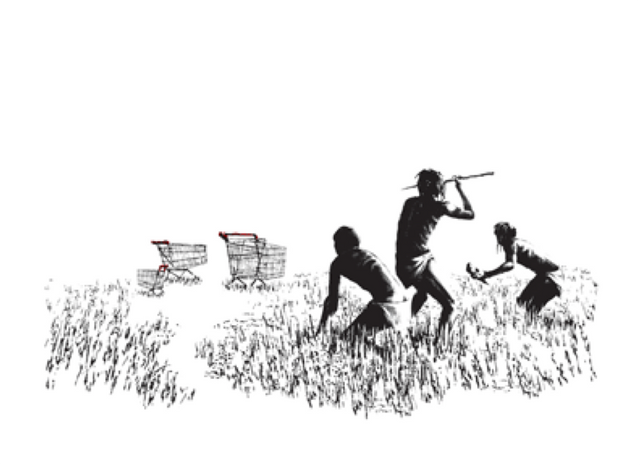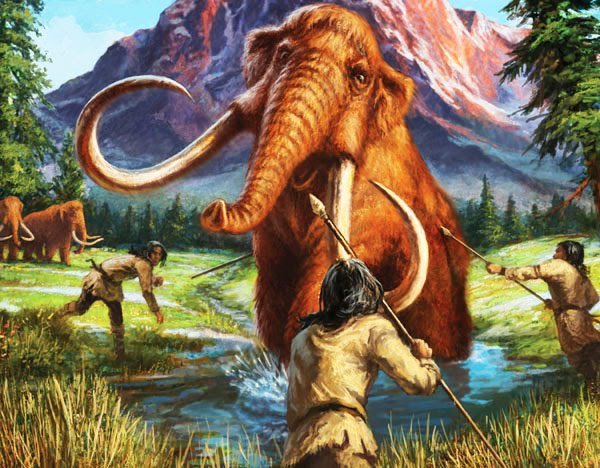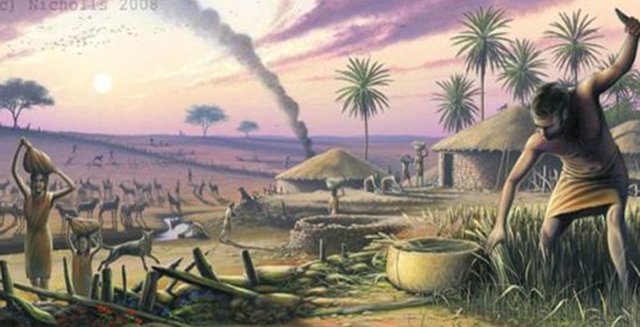Modern Hunter Gatherer - What can we learn from our ancestors? Part 1: Food Acquisition

Image Source(direct link to img)
I research and think a lot about how our ancestors used to live. The questions I look into range from: What did they eat, how did they get their food, what was the social structure, and many more. It's really fascinating and I think we can learn a lot from them. After all, our bodies are not that fast to adapt but on the other hand, the technology is improving and expanding exponentially.
So naturally a question arises - what can we learn from our ancestors? And probably more importantly, how can we use that knowledge in our modern times and integrate it into our life. Because it's not feasible for all of us to start running around naked with a club in our hand.
We should strive to create an integration between a modern life and our hunter-gatherer ancestry to optimize our social, mental and physical health and wealth
So let me start by exploring some areas of our ancestral living - in this article I'll focus on obtaining food, but in later parts I can look into anything from social status, what to eat, how and why to move, etc.
How did we get our food?
This one might seem a little bit obvious. We hunted and gathered as the name suggests right?
Not exactly.
It is known that there were more species of humans on the planet at one point- with some differences between each other. I didn't look into the differences so I can't talk about that. However, there is one thing all these species had in common and that's food acquisition.
The food acquisition of different tribes can be divided into three categories:
- Hunting and gathering
- Husbandry (Domestication)
- A mix of both
Hunting and Gathering
The first category got all their food from the wild. They were foraging, hunting and fishing. often they also lived a more nomadic life. How did that work though?

Image Source(direct link to img)
Well, the thing is, these groups were in tribes and every member of the tribe had a role in the food-acquisition process. As it's not that easy to obtain food.
Let's take obtaining meat from an animal as an example. Having a weapon, then hunting and killing it is the easiest part - though don't get me wrong, it's still not trivial. The hard work actually starts after that.
The meal (in this case the animal) needs to be harvested, transported, acquired, preserved, processed and consumed. And those are not some trivial tasks, especially if you get your animal somewhere far away from your habitat. Somewhere in mountains 3 days hike from your home.
One thing I just want to point out about hunting is that our ancestors (and even most modern hunters) were very sustainable and lived "one with nature". They knew they require its resources to survive so they barely took more than required for survival. In fact, they also took part in actively helping the nature. An obvious example is not killing a pregnant or young animal.
Then there is foraging, or gathering. This requires a different skill-set, or prerequisites than hunting. But that does not make it any less valuable or less complicated. An extensive knowledge is required to find and obtain the right plants, herbs or fungi. And when you gather something, it is important to process it properly.
![]()
Image Source(direct link to img)
Let's take an acorn as an example. Okay, it's not that hard to find as it's quite big and abundant. But once you get it, if you don't prepare it properly (for example boiling for several hours) then it will be deadly, or malnourishing (instead of providing you with nourishment, it would steal nourishment from you). And that is not what we want if we aim to survive.
And for all this knowledge, skills, or even the processing of the food the labour was divided up and therefore tribes were extremely reliant on each other and functioned as one.
They could not survive alone.
And that brings the first problem with this kind of lifestyle. In our modern lives we don't have such communities anymore. We were divided into "individuals", or at most a "nuclear family" (parents and a child). Which means, if you want to obtain your food from hunting and gathering, you'd have a hard time doing that. You'd still have to par-take in modern society and get some of your food that way. As a singular person it is impossible to obtain all your food from hunting and gathering. Maybe if you do it all day and all night and that assumes you already have the skills.
Therefore this is just infeasible to do as an individual in our modern time on a regular basis, and having this as the only source of food.
And even if that would somehow work out, because of the way we treated our planet and the destruction we caused, it's not even feasible from a logistical perspective. If we all went out to get our food from a wild environment then we would completely destroy it (and with that, us as well).
Then there are our jobs, or the fact we live in a huge conglomerate of houses called cities with no wild-life nearby. We also lack the skills and knowledge, especially if we want to do it sustainably as our ancestors.
Though I do believe that some people or groups of people can do this in our modern times if they wish to. It's just not feasible for most of us.
Husbandry
There are some tribes in our past that embraced agriculture and domestication/ husbandry of plants and animals.This group got their food from farms, crops, domesticated or another way to put it, enslaved animals.
This should be very familiar to us as it's how most of people on our planet get food from. In a way, it gave us a lot. But maybe we took it a bit too far...
So let's start with some problems.
A little disclaimer, I will be mostly drawing from our modern agriculture though everything is true to older times, just to a lesser extent.
For husbandry, we need land. To get a piece of land, we need to destroy and suppress the wild form of life on and around that land. We took that to quite an extreme nowadays where we just have huge prison-camps for all sorts of animals and plants and then we also waste it if it's not pretty enough.
Then we need to domesticate the animal and the plant we want which means changing the way it was designed to work. I don't know about you, but as a human being, I tend to fuck things up if I fight the design and interconnection of nature. Which leads to a next point.
Wild food is more nutrient dense than a domesticated one. That is true for animals as well as plants. Sure, the wild counter-part might not be that tasty but we didn't mind that for a long time, did we? And this is a problem. We eat way more than our ancestors but on average we get half or even less of the nutrients of our ancestors. This is staggering.
Enough ranting. There are some good sides to this, too.
Nowadays, only very small percentage of people (as small as 3 %) actually work on obtaining food. And that number is decreasing rapidly. This gives most of us a possibility and potential to do other things and expand ourselves and humans as a species. And that's great. There would be no Steemit if most of us had to obtain our own food.
We still do that in a way, but it's more indirect approach. We work to have money to buy food. And that takes less effort than having to grow or gather the food ourselves.

Image Source(direct link to img)
The Mixture
I will not spend much time on this as I'd say it's rather self-explanatory.
This group acquired their food both by hunting and gathering as well as some form of husbandry. Usually that involved domesticated kettle that was able to live a nomadic life with the tribe. Sometimes it was some plant that was seasonal and low-maintenance, like root vegetables.
What can we take from this?
From my perspective, we need to acknowledge the problem with the way we do things nowadays and where our food comes from. This is not sustainable and we need to support, with our choices and our money, the food that was obtained sustainably and we know where it came from. This goes against the current trend of globalizing everything and putting everything into a huge conglomerate of power (See Monsanto). This way we are also losing power over our food. We don't get to decide what we put in our bodies.
So I think there are two paths we, as modern human can take:
- Get food from a local and sustainable source (like your local farmer Dave)
- Obtain some of your food yourself.
-- this can be done by hunting, gathering, farming, fishing or the mixture of them all.
-- for the rest of your food refer to point number 1.
The choices is yours to make. And I suggest that you should pick one of these two choices even if you want to do it just for your own health.
If you have any questions or comments, things you would like to know about our ancestors and how they did things, the way I can improve the information I am trying to convey and share, let me know in the comments.
About the Author;
Hi, I am Joe and I love freedom.
Freedom of all sorts, social, financial, emotional, physical, freedom from your stuff or place.
My biggest passion is to show that it is possible to live life being free, work towards my freedom, and help others obtain their own versions of freedom.
I also love exploration and experimentation (of all senses).
My articles are about all of this (Freedom, exploration, experimentation)
as well as my own transparent and authentic experiences.
Hiya - I really enjoyed this article!
I'm doing a PhD about the wildfood scene in Brazil and am especially interested in why people forage now a days. Trying to win autonomy in the face of the unsustainability monster of modern industrial agriculture is a big factor!
I'd be chuffed if you follow me and I'll have people interested in the topic to read anything that I blog!!! Really pleased that there seems to be a vibrant foraging community on here - no big surprises I guess!!! Steem very much attracts people trying to wriggle out of the system!
Peace & Steemit!! x
Oh nice one :).
I'm glad that you enjoyed my post after such a long while :).
What are you finding so far in your PhD? Are you focusing on Brazil?
I'm focusing on Brazil but I'm doing an online questionnaire and will also launch it in the UK to do a comparison...I was half thinking of launching it for the US audience as well as it'd pretty much be the same questionnaire just need a little tweaking and it could be pretty interesting.
I'm finding that here in Brazil it has all the elements of a movement - with strong social justice and autonomy seeking motivations. It's very linked to the agroecology movement and also the gastronomy scene - so I'm interested to see if it acts like a bridge, that leads people from the gastronomy scene to the agroecology and sustainability scene (and hence adjust their value systems regarding the environment to accommodate that). Also, whilst there is a general loss of interest practice and knowledge in general among the more rural populations where the majority of this info is stored, there is a huge surge in interest among the middle class of the cities. Which simply reflects similar trends in Europe and probably many other parts of the world too.
Oh, and there's all sorts of cool funky plants with amazing nutritional properties!
Great article. More motivation towards local farmed food received, thanks. Also I should finally start to grow stuff…
Hey man, loved this article - keep it up! I'll follow you for more :D
Thanks man, I appreciate it :).
Do you have any tips or something you'd rather hear about?
Oh man, you just write about things that interest you. I find myself researching a topic for my articles and then find other interesting things to write about during that research. So my subject areas come along in groups, eventually I get a bit tired of writing the same subject and find something new. You can scroll back and check all my history.
As for a tip, never give up! Write a decent or better article as often as you can and people will start to follow you. :D
Oh, I read your post on "I am not my job" a while back and I absolutely loved it as I completely agree. And right now I am also deciding whether to take a job and it's actually a nice reminder (after re-reading it now) that if I take the job, it doesn't mean I am that job.
So thanks :).
I'll still most likely write a self-reflection post about my thought process right now as the job offer kinda put me in depression for few hours/day :D.
It's interesting to think about the differences in what we would want to forage now, versus what earlier people would have prioritized, too. They would have been looking for calorie-dense foods. But our calorie requirements are less now. So we can focus on nutrient-dense foods.
I eat a lot of wild salads, like this one. They are delicious and nutritious. But I don't think of that as living like earlier people. It's building on what earlier folks knew, but fitting into today.
I think it would actually be easier to support ourselves today on wild foods, compared to then. Because our calorie requirements are so much lower. And our food storage options are so much easier.
That's a good point. An example would be a dandelion. Honestly, if I had to go out and survive just from wild food, I would probably not care much about dandelion. Anything else is so much more filling.
That's one of the reasons it's kind of important to find a mentor that is getting at least half of his food from foraging to actually learn a lot and skills that can last you. I have no idea where to find a person like that. (I only know of someone in Mayne, but I am not even in US so ... ).
Though I am not sure if I completely understand one of your points. Are you saying we require less calories/food? What's the basis of that? Because we barely move? I think that's a problem and I'll most likely write an article on that, too when I get inspired.
The weed salads I make are incredibly filling. They are so dense and there is so much bulk. They are way more filling than soup or a sandwich! But there are a lot of greens in one salad. I ought to weigh them sometime!
Yes, I'm saying that we don't need as many calories as folks back then. At different times, I've lived outdoors for months or in harsh conditions - and needed 6000 calories a day. Even in an active modern life, I can't come close to needing that -- 2000 calories is plenty. I think that higher calorie demand is more like what a hunter-gatherer society would need, though, especially in the cold months.
I'm also saying that our ability to store food is so much better now. So we can freeze wild foods or can them, not just dry them. Even fermentation and dehydration are more practical now, because we don't have to move from one place to another.
Thank you for following and upvoting @foraging-trail
You can find out more about the Steemit Foraging community and guidelines for being upvoted by the @foraging-trail here and here.
Thank you for your request to include this post in the STEEM BOOSTER list!

The post is not approved because you must power up minimum 100 STEEM in the last 24 h to reach our list.
Please submit again your link when you will power up minimum 100 STEEM in the last 24 h and be sure to not power down when requesting approval!